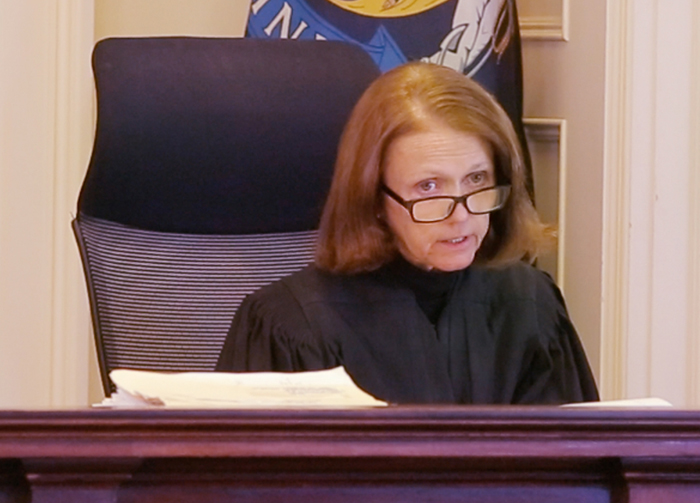ALFRED — The judge presiding over closed-door jury selection in the trial of a key defendant in the Kennebunk prostitution case said Thursday that she would not reconsider her decision to exclude the media from the jury selection process.
Justice Nancy Mills spoke from the bench briefly Thursday morning after an attorney for the Portland Press Herald appeared in York County Superior Court to argue that the jury selection process should be opened.
Mills made a statement, but took no arguments, before resuming the third day of jury selection for the trial of Mark Strong Sr. of Thomaston, who is accused of conspiring with Alexis Wright to run a one-woman prostitution business from her Zumba studio in Kennebunk. Wright allegedly kept meticulous records of about 150 customers, including some well-known figures.
The Press Herald filed a motion with the Maine Supreme Judicial Court on Wednesday morning seeking an opinion on Mills’ decision to bar the media from the process, but Chief Justice Leigh Saufley has yet to issue a decision.
“Everything I’ve done in the past two days has been appealed,” Mills said, addressing attorney Benjamin Piper, representing the Press Herald. “I think the time for reconsideration is over, and we’ll wait to hear from the Law Court.”
Mills said Wednesday that the media has given “unprecedented” attention to the cases involving Strong and Wright and that never before in her 19 years as a judge has she been unable to seat a jury in a single day.
The jury selection process for Strong’s trial is now in its third day. Questions being posed to potential jurors focus on whether they had heard news reports about the case and whether they are acquainted with any of the people involved, according to a blank juror questionnaire the judge released. Topics in the questionnaire include religion, pornography, prostitution, adultery and government spending.
Strong, 57, has pleaded not guilty to 59 misdemeanors, including promotion of prostitution, violation of privacy and conspiracy to commit those misdemeanors.
Wright, 30, of Wells, is scheduled to stand trial on 106 counts in May. She has pleaded not guilty to all charges, including promotion of prostitution, engaging in prostitution, invasion of privacy, conspiracy, tax offenses and receiving welfare benefits when ineligible.
Attorneys for the Press Herald have argued that First Amendment case law shows that the jury selection process should be open except in the most extreme circumstances, such as national security.
The U.S. Supreme Court has held that “trial courts are required to consider alternatives to closure even when they are not offered by the parties,” or by anyone else, on the principle that court proceedings should be open to the public to both protect the innocent and serve the public’s interest in maintaining confidence in the criminal justice system.
This story will be updated.
Send questions/comments to the editors.



Success. Please wait for the page to reload. If the page does not reload within 5 seconds, please refresh the page.
Enter your email and password to access comments.
Hi, to comment on stories you must . This profile is in addition to your subscription and website login.
Already have a commenting profile? .
Invalid username/password.
Please check your email to confirm and complete your registration.
Only subscribers are eligible to post comments. Please subscribe or login first for digital access. Here’s why.
Use the form below to reset your password. When you've submitted your account email, we will send an email with a reset code.